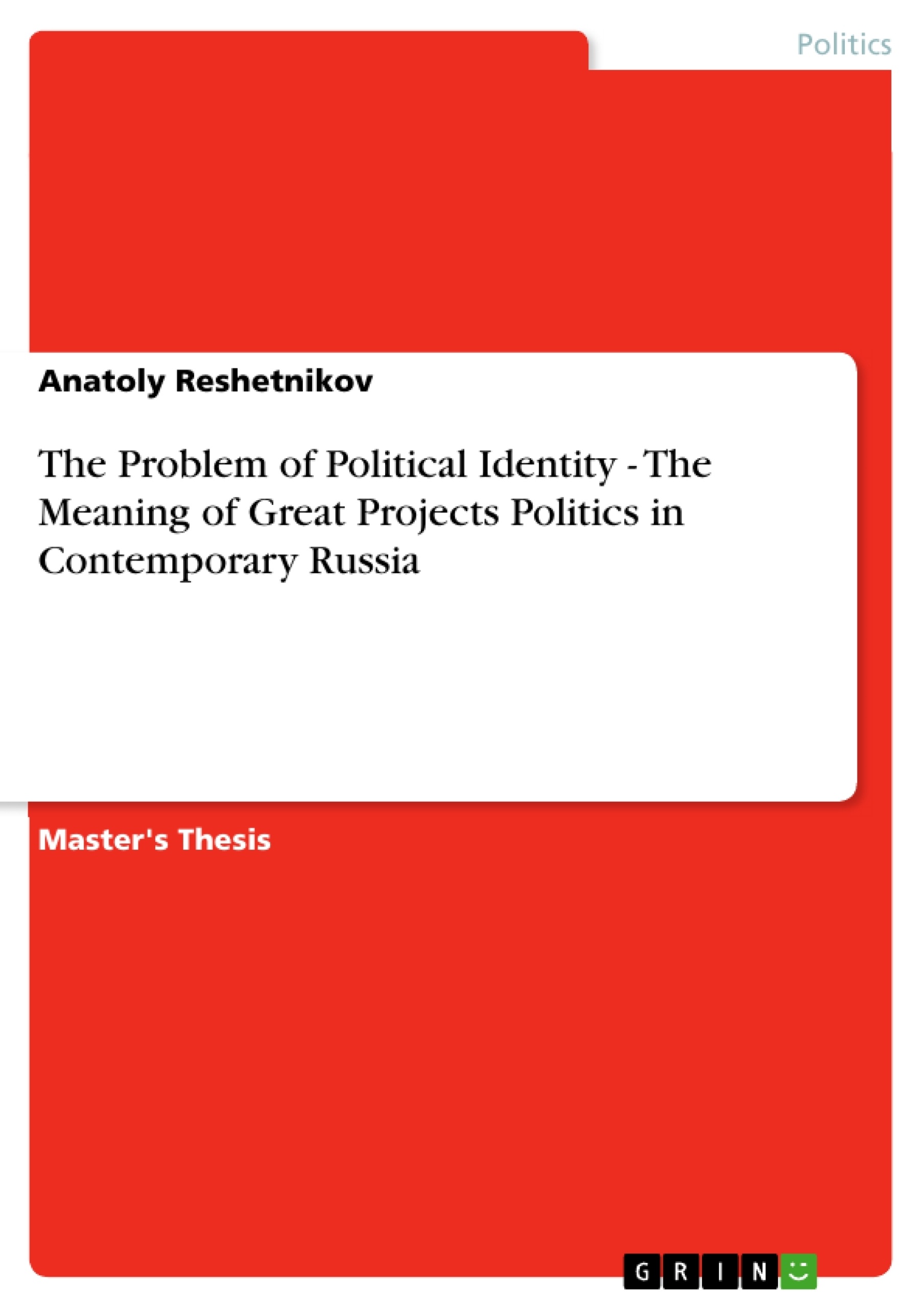The problem of political identity is one of the most topical issues in constructivist IR theory. The understanding of identity construction as well as the adequate interpretation of its foreign policy implications can help explain the meanings behind the actions of major international actors. The work deals with the problem of political identity in contemporary Russia, by engaging with and extending the temporal scope of the constructivist analysis, conducted by Ted Hopf in his book Social Construction of International Politics. It suggests that the great projects politics of contemporary Russia, which is linked to the specificity of its political identity and seems to be similar to that of the late-Soviet period, can, in fact, be better understood, if another work on Russian identity (The Ethics of Postcommunism: History and Social Praxis in Russia by Sergei Prozorov) is also taken into account. Hopf’s analysis, while providing a valuable theoretical framework and linking the state’s identity to the great power status, does not trace the evolution of the latter status and confines itself to two years of Russia’s development, namely, 1955 and 1999. Prozorov’s book, while thoroughly analyzing the identity of contemporary Russian state, is limited within the domestic realm and fails to address the idea of great power, which Hopf believes to be an integral part of Russian political discourse and which is possible to interpret, only if the analysis extends beyond national borders. The research incorporates Prozorov’s theoretical contribution into the framework of Hopf, thus merging the mentioned approaches and making them applicable to the contemporary Russian condition, both domestically and within IR.
Inhaltsverzeichnis (Table of Contents)
- Chapter 1: Social Constructivism and the Great Power Identity
- 1.1 Social constructivism and the great power as a customary discursive component in Russian and Soviet foreign policy making.
- 1.2 The changing of the great power concept
- 1.3 Domestic great projects and historical politics as a compensation for the crisis of internationally recognized 'greatpowerness'.
- Chapter 2: The Condition of Postcommunism and the Nature of the Great Projects Politics.........……….
- 2.1 ‘Bespredel' and the ‘true end of history': Russian politics in the 1990s.
- 2.2 'Dictatorship of law': Putinite era and the lack of political identity.
- 2.3 Contemporary great projects and the ritual of being a great power.
Zielsetzung und Themenschwerpunkte (Objectives and Key Themes)
This work investigates the problem of political identity in contemporary Russia through the lens of constructivist IR theory. It examines how the concept of "great power" has evolved within Russian political discourse and how domestic "great projects" have been employed to compensate for the perceived loss of international recognition as a major power. The analysis draws upon both Ted Hopf's framework of "social construction" and Sergei Prozorov's work on the "ethics of postcommunism" to provide a comprehensive understanding of Russia's identity formation in the post-Soviet period.
- The social construction of political identity
- The concept of "great power" in Russian foreign policy
- The role of domestic "great projects" in shaping Russia's identity
- The influence of postcommunism on Russian politics
- Russia's relationship with the West and its international standing
Zusammenfassung der Kapitel (Chapter Summaries)
Chapter 1 explores the theoretical framework of social constructivism and its application to the concept of "great power" in Russian foreign policy. It examines how the meaning of this concept has shifted over time and how domestic policies have been used to maintain a sense of "greatpowerness" in the face of perceived international decline.
Chapter 2 delves into the specific context of postcommunism in Russia and the emergence of "great projects" as a means of political legitimacy and identity construction. It analyzes the "Bespredel" era of the 1990s and the subsequent "dictatorship of law" under Putin, exploring how these periods shaped Russia's political landscape and its relationship with the international community.
Schlüsselwörter (Keywords)
The central keywords and focus topics of this research include political identity, social constructivism, great power, Russia, postcommunism, "great projects," international relations, and foreign policy. The analysis draws upon theoretical frameworks developed by Ted Hopf and Sergei Prozorov, exploring how concepts of identity, power, and international status have shaped Russia's political landscape and its role in the international system.
- Quote paper
- Anatoly Reshetnikov (Author), 2010, The Problem of Political Identity - The Meaning of Great Projects Politics in Contemporary Russia, Munich, GRIN Verlag, https://www.hausarbeiten.de/document/153998


